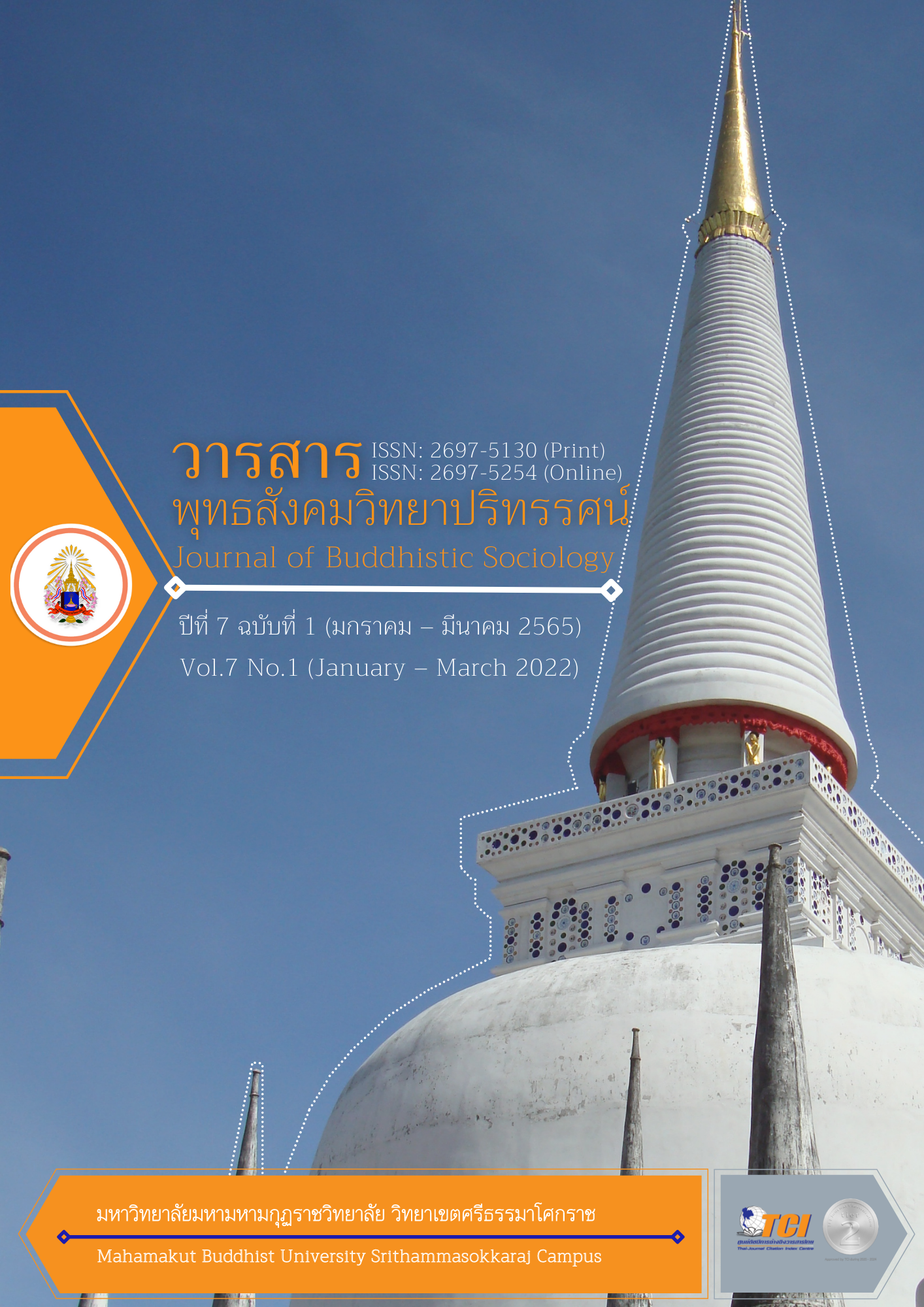DEVELOPMENT OF ONLINE LESSONS ON DESIGN, PRODUCTION, AND APPLICATION OF DIGITAL TECHNOLOGY MEDIA FOR EDUCATIONAL PURPOSES BY USING THE THEORY OF CONSTRUCTIONISM TO CREATE THE WORK FOR SECOND--YEAR UNDERGRADUATE STUDENTS, NAKHON SI THAMMARAT COLLEGE OF DRAMATICS ARTS
Main Article Content
Abstract
The development of online lessons on design, production, and application of digital technology media for educational purposes by using the theory of Constructionism to create the work for second-year undergraduate students, Nakhon Si Thammarat College of Dramatics Arts was the experimental research with the control group and having pretest and posttest. The research aimed to 1) develop an online lesson on design, production, and application of digital technology media for learning using the theory of Constructionism to create the work to be effective under the 80/80 criteria, 2) compare the post -student achievement between the experimental group studying based on online media lessons and the control group studying by the demonstration method, and 3) study the satisfaction of the experimental group learning with online lesson media. The sample group was 40 second - year undergraduate students who enrolled in the Information and Communication Technology Education course in semester 2, the academic year 2021 of Nakhon Si Thammarat College of Dramatics Arts. The sample group, selected by purposive sampling, was divided into an experimental group with 20 students and a control group with 20 students.
The results showed that:
1. The experimental group's efficacy analysis results were 89.96/95.43, which was higher than the established benchmark (80/80).
2. When comparing the results after school achievement of the experimental group and the control group, it was found that the experimental group who studied online lessons had higher post-student achievement than the control group who studied with the demonstration teaching at the statistical level .01.
3. The study results on the satisfaction of the experimental group using online lesson media found that overall, the students had the highest level of satisfaction.
Article Details

This work is licensed under a Creative Commons Attribution-NonCommercial-NoDerivatives 4.0 International License.
References
ฉัตรศิริ ปิยะพิมลสิทธิ์ และคณะ. (2552). การพัฒนาบทเรียนออนไลน์ วิชาหลักการวัดและการประเมินผลการศึกษา. กรุงเทพมหานคร: คณะศึกษาศาสตร์ มหาวิทยาลัยเกษตรศาสตร์.
ทิศนา แขมมณี. (2550). ศาสตร์การสอน: องค์ความรู้เพื่อการจัดกระบวนการเรียนรู้ที่มีประสิทธิภาพ (พิมพ์ครั้งที่ 5). กรุงเทพมหานคร: สำนักพิมพ์แห่งจุฬาลงกรณ์มหาวิทยาลัย.
ธนพงษ์ ไชยลาโภ และคณะ. (2559). การพัฒนาสื่อบทเรียนออนไลน์ เรื่องการออกแบบเพื่อการผลิตสื่อปฏิสัมพันธ์และมัลติมีเดีย. วารสารวิชาการนวัตกรรมสื่อสารสังคม, 4(2), 134-143.
ธเนศ ขำเกิด. (2548). การสร้างความรู้ตามทฤษฎี Constructionism. วารสารเทคโนโลยี (สมาคมส่งเสริมเทคโนโลยีไทย-ญี่ปุ่น), 31(178), 163-164.
นิตยา มั่นศักดิ์. (2560). การพัฒนาบทเรียนบนเครือข่ายอินเตอร์เน็ตเรื่อง การสร้างและตกแต่งงานคอมพิวเตอร์กราฟิกด้วยโปรแกรมกราฟิก สำหรับนักเรียนชั้นประถมศึกษาปีที่ 6. ใน การศึกษาค้นคว้าด้วยตนเอง การศึกษามหาบัณฑิต. มหาวิทยาลัยนเรศวร.
ล้วน สายยศ และอังคณา สายยศ. (2536). เทคนิคการวิจัยทางการศึกษา (พิมพ์ครั้งที่ 3). กรุงเทพมหานคร: ศูนย์ส่งเสริมวิชาการ.
สายใจ คุณบัวลา. (2558). ผลสัมฤทธิ์ทางการเรียนคอมพิวเตอร์แอนนิเมชั่นเบื้องต้น และความสามารถในการใช้เทคโนโลยีของนักเรียนชั้นมัธยมศึกษาปีที่ 3 ที่สอนโดยใช้ทฤษฎีการสร้างความรู้ด้วยตนเองโดยการสร้างสรรค์ชั้นงาน. วารสารจันทร์เกษมสาร, 21(40), 99-108.
สำนักงานคณะกรรมการการศึกษาแห่งชาติ. (2545). พระราชบัญญัติการศึกษาแห่งชาติ พ.ศ. 2542 และที่แก้ไขเพิ่มเติม (ฉบับที่ 2) พ.ศ. 2545. กรุงเทพมหานคร: สำนักงานคณะกรรมการการศึกษาแห่งชาติ.


